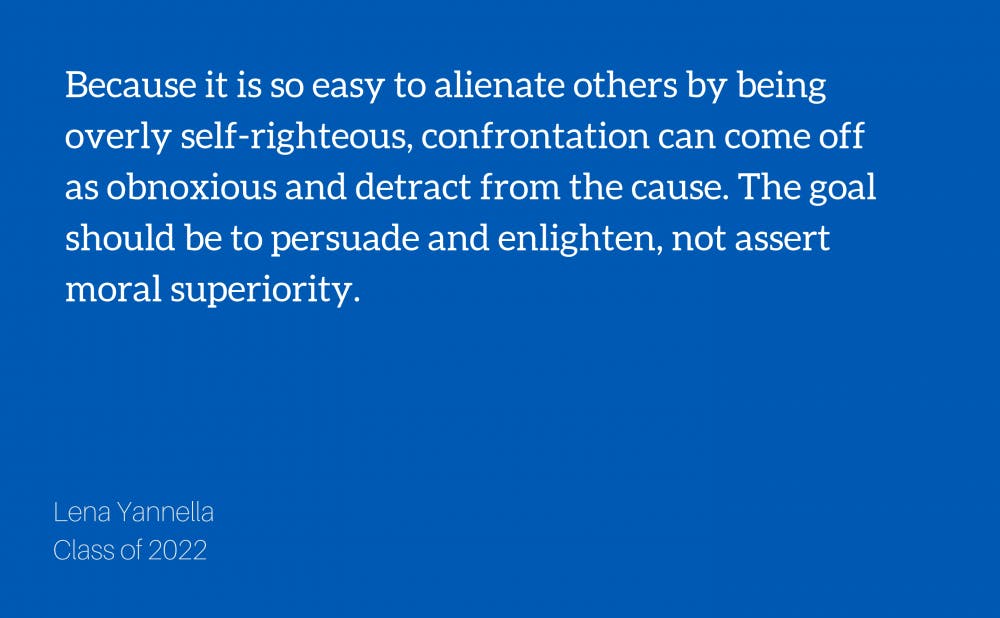My friend has a history of working with cognitively disabled children. If he overhears someone casually say something is “r*******,” he does not hesitate to speak up. Yet when he saw Marketplace was serving fish tacos again, he offhandedly remarked, “Oh my god, I’ll blow my brains out if I have to eat that again.” I have no interest in seeing my friend’s brains splattered across Marketplace and, frankly, am offended. Should I call him out?
Meet Jane, a typical mom driving her boys to soccer practice, sporting a hundred bumper stickers on the back of her Honda pilot. “Save the Mississippi Gopher Frog.” “My Other Car is a Hummer.” “Just Say No to Drugs.” “Legalize Pot NOW!”
You don’t want to be Jane, spewing miscellaneous opinions like noxious exhaust. Despite the validity and urgency of some of her causes, Jane’s message is obscured by her annoying and crazed presentation. It’s a classic case of less would have been more.
Which brings me to the question of whether you should call out your friend. There are two prongs to this ethical quandary. The first is whether to draw your friend’s attention to his uneven application of political correctness. The second is whether to address his inappropriate reference to gun violence and suicide.
Regarding the first, the most effective activists often have laser-like focus on a few issues. This may result in tunnel vision or inability to perceive anything beyond one’s field of interest.
For example, while the environmental warrior righteously tells store clerks that no, he does not want a plastic bag that will eventually end up in a whale’s intestines, he may not be up to date on his gender-neutral pronouns. In turn, his roommate, who makes liberal use of Xe, Xem, Xyr, may make cringe-inducing comments about the residents of “fly-over” states. Both are holier than thou on certain topics but clueless on others.
Nobody can be everything to everyone, except Jane, and you can see how well that’s working. Given the cross currents of contemporary social and political movements, it is almost inevitable that your friend will be selectively sensitive to causes that relate to his own human experience.
At the same time, if your friend chooses to call people out, that triggers an obligation for him to be extra vigilant about what he says. By consistently confronting others, he puts himself on a moral high ground and raises the bar. But he can’t raise the bar for others without clearing it himself.
Let’s turn to your second option of engagement: addressing the political incorrectness of his “blow my brains out” comment.
There was a time when such language was unremarkable. Some still might argue that his words are just a harmless expression of frustration. But someone who has been affected by suicide or gun violence might not be so blase. In fact, she might be deeply disturbed.
If you are sufficiently bothered by your friend’s language, say something. But it’s a personal decision. It only sounds convincing if you feel good about saying it. Calling someone out only works if you have the proper confidence, tone, and relationship to call them out. And if you call everyone out, then you’re like the driver with twenty five bumper stickers. No one will take it seriously.
On the other hand, one cannot be too timid. As Elie Wiesel said, “Silence encourages the tormentor, never the tormented.” It is cowardly and shameful to say nothing and turn away from blatant injustice.
If you choose to call someone out, presentation is everything. Because it is so easy to alienate others by being overly self-righteous, confrontation can come off as obnoxious and detract from the cause. The goal should be to persuade and enlighten, not assert moral superiority.
You Make The Call
An overweight tourist riding in a horse drawn carriage ride exclaimed to her companion, “I’m famished. I could eat a horse!” Who, if anyone, has a right to be offended:
a) her companion,
b) the horse,
c) the driver,
d) none of the above
Answers next week.
Get The Chronicle straight to your inbox
Sign up for our weekly newsletter. Cancel at any time.
Lena Yannella is a Trinity sophomore. Her column runs on alternate Tuesdays.

